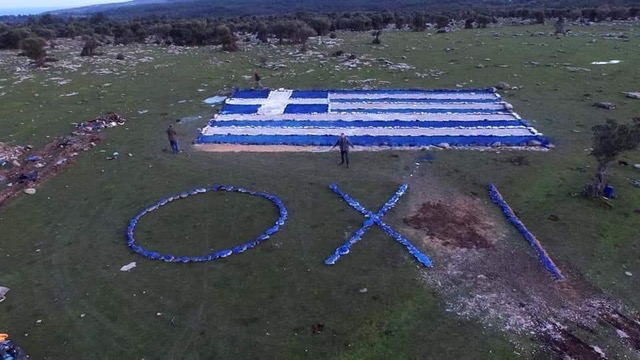Not in My Backyard Phenomenon (NIMBY), also called Nimby is defined by the encyclopaedia Britannica as “a colloquialism signifying one’s opposition to the locating of something considered undesirable in one’s neighborhood”.
Does that ring a bell?
Let’s just address the elephant in the room…that clearly is not me after the quarantine.
Greece and particularly the islands of Chios, Lesvos and Samos came face to face with the phenomenon “Not.In.My.Back.Yard”.
I am guessing that it is not called “Not In My Buckingham Palace Yard” and just back yard, because the opposingg party usually belongs to the middle or low social stratification.

The case here is that the islanders turned into NIMBYs in their attempt to oppose to the construction of new migrant detention camps. Their reactions are quite justified since the number of immigrants and refugees reaching the islands on daily basis is getting higher and higher. The already existing facilities are not enough to accommodate this number and the people live in self-made huts built out of branches on farmer’s land.
At the same time the local residents’ life has turned worse.
Their villages are transformed into an endless multicultural ghetto quite uncommon for the peaceful and isolated islanders in the past. In addition, criminal behaviours have been increased and the residents are afraid and insecure. The camps are also more prone to a Covid-19 outbreak since they are overcrowded and lack hygiene.
Finally, the residents are people who care, and it is not easy for them to see the pain of children and women in the camps and not be able to do anything about it.
Getting back to Nimbyism, under the threat of turning their islands into huge camps, residents of different parties, ideologies and social backgrounds all united against the common enemy. In this case, the government’s policy.

Why did this happen?
In order for a government to avoid opposition, it must have allies. The government’s allies are the municipal authority and the local press. In this case, both had no choice but to stay as neutral as they could to avoid backlash. Minister, Mr Mitarakis in one of his interviews (https://www.youtube.com/watch?time_continue=586&v=xOu7jPFS6zY&feature=emb_logo) οn Alfa channel in February stated that the construction of closed camps had been discussed with all the local authorities in the past hence they were aware. However, when dealing with Nimbyism some strategies are usually followed.
What are some those?
-Locate and identify allies.
-Make them express their support. In order for this to be effective the supporters must have direct or indirect benefits from this project.
-correct any misinformation.
-understand opposition and gain people’s trust through mutual priorities and not conflicts.
In Chios and Lesvos that did not happen. Despite the minister’s efforts to persuade the people to accept the new camps and his promises that the already existing ones will close, the people were not convinced. Instead their reaction was ignored since they were informed daily that despite their opposition the agreement between the government and the constructors had been made. The situation deteriorated when the minister sent an army of special anti-riot police forces to prevent any riot from happening.
The people took it in another way and of course violence brought violence. The local authorities were among the victims of tear gas during the peaceful protest. Pictures of the mayor passing out from tear gas in front of the local press were all over the internet.
What happened between the minister and the local authorities?
Well, it is simply because a reason for winning the election was the firm promise that all the immigrants and refugees would abandon the islands magically and the islanders would turn back to their life as they knew it before all this. The local authorities live with the locals. So, when they realised that they cannot turn against their voters, they turned against the minister and hence the government.
Now, as far as I can tell the minister is looking for local allies in every island and he will probably start with the ones who are more prone to accept the project due to the direct or indirect benefits they will have. Mr Mitarakis recently stated that Leros, Kos and Samos have agreed to the construction of the closed camps.
(https://www.libre.gr/n-mitarakis-sto-libre-den-dimioyrgoyme-nee/).
All we have to do now is watch and wait under the threat of the pandemic. Personally, I believe that the tactics are always successful, however, the people unpredictable.

